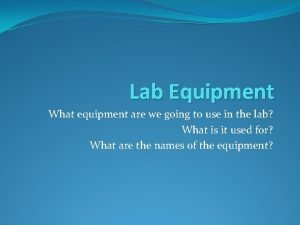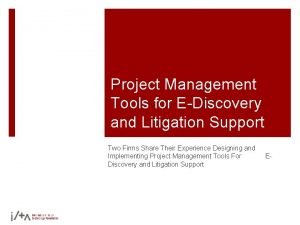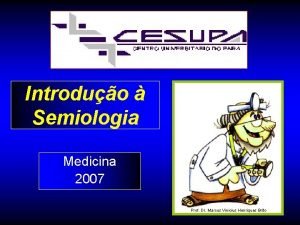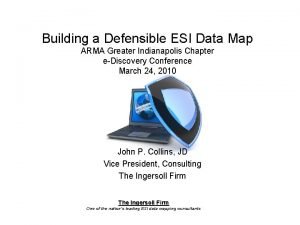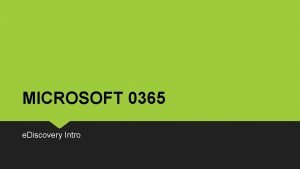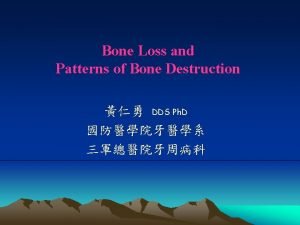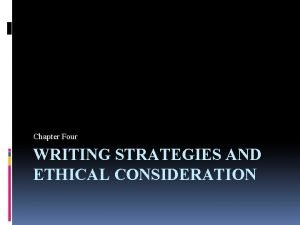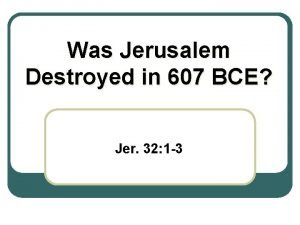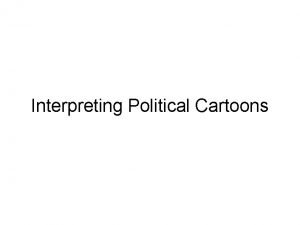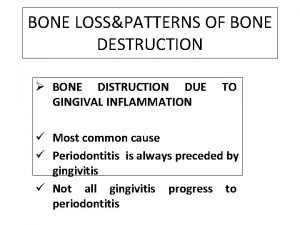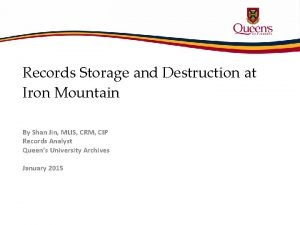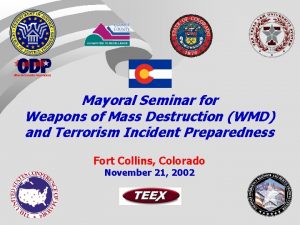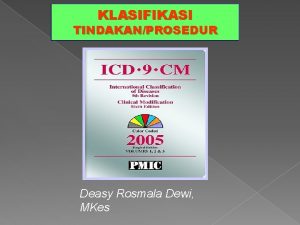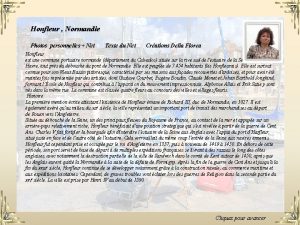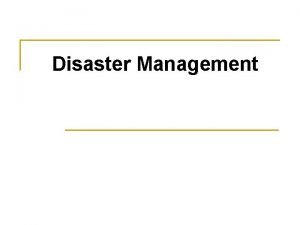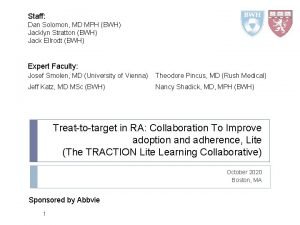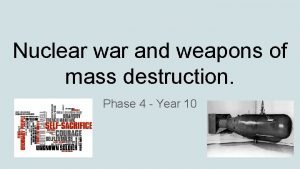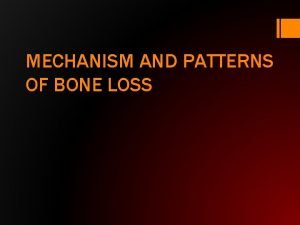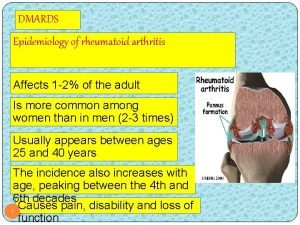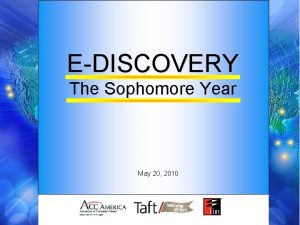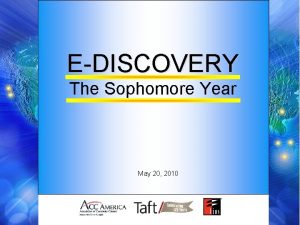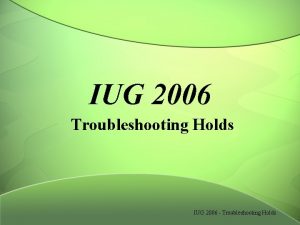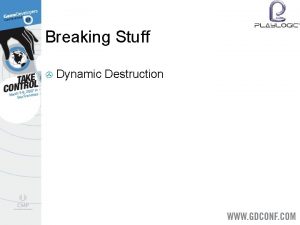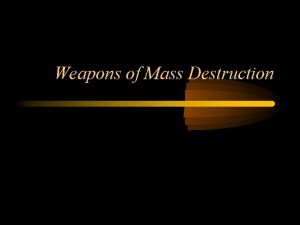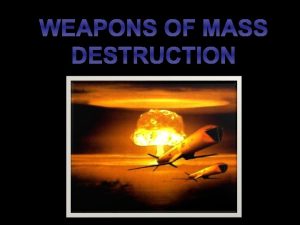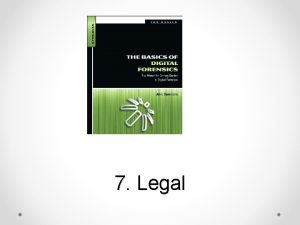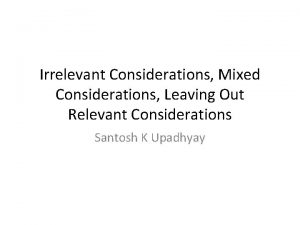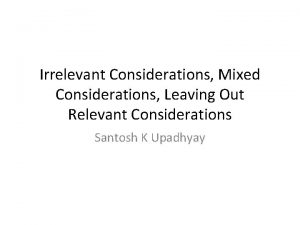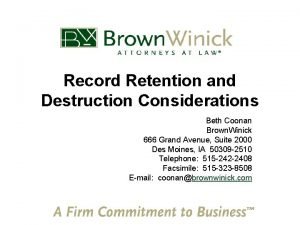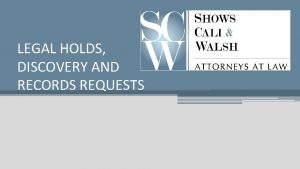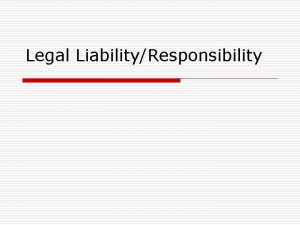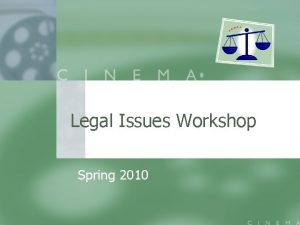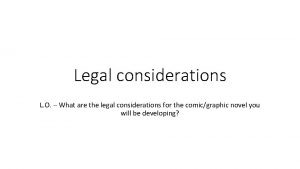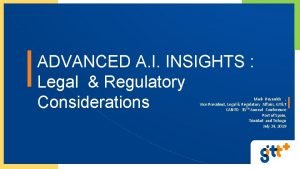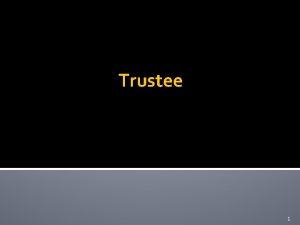EDiscovery Destruction Considerations and Legal Holds Mark Henriques
































- Slides: 32

E-Discovery, Destruction Considerations and Legal Holds Mark Henriques Partner Womble Carlyle Sandridge & Rice, LLP

Overview v. Records Retention and Destruction v. Litigation Holds v. Implementation v. Management v. Sanctions v. Role of E-Discovery Counsel & ECA


Document Retention & Legal Holds v Duty to preserve arises when you reasonably anticipate litigation (e. g. discrimination claim, letter from attorney, etc). v Absent claim, business reasons and compliance laws dictate what is retained. 4

Who implements a legal hold? 1. In-House Counsel 2. Outside Counsel 3. Vendors

When is Litigation “Reasonably Foreseeable? ” v Formal Complaint is made or filed. v Incident or Dispute arises. v Regulatory or governmental Agency Investigates/Audits entity. v Discovery Request sent by third party. v Legal Hold/Document Preservation Request initiated.

How is the hold implemented?

Litigation Off Switch Immediately stop deletion of email and other electronic documents 8

Identify the KEY PLAYERS. . . We’re meeting with them on Day 1! The Litigation Hold begins with their e-mail, documents and data. 9

Custodian Interviews v Ask what relevant documents they have? v How are the documents maintained? v Who is IT representative that can describe system security and processes? v Where are the documents stored? – Go over possible storage locations (If have completed a document flow chart with IT use it) v Any other custodians? (Who else has data? ) 10

Legal Hold Notice v. Should come from senior official (General Counsel is a good choice). v. Define document broadly – Make sure everyone understands include electronic documents. v. List what categories of documents should be retained. v. Include time frame of documents to be retained. v. Include who to call with questions. 11

Legal Hold – Administrative Issues v. Often good to ask each person who else in the company might have responsive documents (and then add them to your hold). v. Good practice to have each person sign hold to acknowledge received and have complied (of course you must follow up to get all back). v. Send periodic Hold reminders to custodians. v. Track Holds electronically, if possible. 12

Legal Hold - IT Issues v. Establish identity of 30(b)(6) - IT staff member. v. Consult with IT staff (preferable in advance of needing/issuing litigation hold). v. Establish technical parameters of hold, i. e. : v Stop auto deletion v Secure files v Notify IT of all custodians and supplement as more custodians are identified 13

What about Personal Devices v Almost everyone has some BYOD issues. v Litigation increasingly involves these devices: v Percentage of companies which had to preserve/collect data from an employee’s mobile device continues to increase. v Best practice to include BYOD/Data on Mobile Device in Litigation Hold Notice. 14

E-Mail in Litigation Holds v Decide how to handle email – Best solution is often to have IT handle rather than individual user. If your company uses automatic deletion, dangerous to have custodians have responsibility to keep. v If individuals users, need to be sure keep in native format (e. g. not print out). v Another solution is to have users put emails in a secure location (server/drive). 15

Texts, Instant Messaging, Social Media v. Need to consider text message v. Does your company use IM/OM? v. What about calendar entries? v. What about to do lists/task lists? v. What about voicemails? v. What about social media? – Do you need to preserve company Facebook page, etc. ? 16

Managing Litigation Holds v Must be documented v Need a tracking tool v Outside counsel can help manage / maintain privilege / advise on hold v Send Reminders – Every 6 -12 months so employees do not forget about hold v Have a process to address documents when an employee leaves 17

When Litigation Resolved v. Be sure to lift hold when litigation is resolved. v. Can be tricky if multiple litigation holds (with possibly overlapping information) in place. v. Some e. Discovery platforms address this issue with multiple, overlapping ESI folder systems. 18

Where do we look for guidance? v Sedona Conference v Judge Scheindlin’s Zubulake opinions v Advisory Committee Report v Recent Case Law / Reporters 19

Is the Data Accessible? Judge Scheindlin’s Hierarchy Most to Lease Accessible Active, on-line data Near on-line data Offline storage / archives Back-up Tapes / Disaster Recovery Erased, fragmented or damaged data 20

Sanctions Most Commonly Sanctioned Behavior: v Destruction of evidence (84%) v Delayed production (16%) Most Common Sanction: v Attorney’s fees and costs are the most commonly granted sanction (60%) v Evidentiary preclusion (30%) v Adverse inference instructions (23%) v Dismissal or default (23%) 21

Recent Decisions v Selective preservation warrants adverse inference. Calderon v. Corporacion Puerorique a de Salud (D. P. R. 2014) v Adverse inference and monetary sanctions for failure to issue litigation hold or monitor preservation efforts. Zest IP Holdings, LLC v. Implant Direct Mfg. (S. D. Cal. 2013)

Recent Decisions v Litigation hold triggered by patent evaluation. Lending Tree v. Nex. Tag (W. D. N. C. 2014) v Must show missing evidence was relevant to litigation for sanctions. Automated Solutions v. Paragon (6 th Cir. 2014) v E-Discovery dispute should not be used as a tactic. Procaps S. A. v. Patheon, Inc. (S. D. Fl. 2014) 23

Litigation Hold Management System The Sedona Conference’s Commentary on Legal Holds: The Triger and the Process emphasizes that litigation hold policies and practices should be tailored to a client’s individual needs. The guidelines are not intended and should not be used as a “checklist” or set of rules that are followed mechanically. Instead, they should guide entities in articulating a policy for implementing legal holds that is tailored to their individual needs. ” www. thesedonaconference. org 24

OLD CORPORATE LITIGATION MODEL Outside Law Firms Corporate General Counsel 14 25

OLD CORPORATE LITIGATION MODEL E-Discovery Component Outside Law Firms (with E-Discovery) Corporate General Counsel E-Discovery Component 15 26

NEW CORPORATE LITIGATION MODEL Outside Law Firms: Trial Counsel Corporate General Counsel E-Discovery consolidated with e-Discovery counsel E-Discovery Counsel 16 27

E-Discovery Counsel Benefits 17 1. Systems Mapping ▲▲▲ 2. Data Preservation ▲▲ 3. Discovery about ESI ▲▲ 4. Rule 26(f) Conference ▲▲ 5. Data Collection ▲ 6. Early Processing ▲ 7. Search/Data Analytics ▲ 8. Privilege Management ▲ 9. Process Audit Capability ▲▲ 28

Early Case Assessment • Quick determination of key claims, issues, players and sources of documents • Identify, preserve and collect ESI related to claim • Use Technology Assisted Review (TAR) to quickly identify most of the key documents • Option of written, privileged claim assessment

CONCLUSION v Most cases now involve e-discovery v Almost all newly created information is stored electronically v Expensive and time consuming, but potential source of key discovery v Electronic documents constantly changing – may want to image to preserve now

RESOURCES v Sample Retention Policies v Sample Litigation Hold Notice v Purging the Cloud: Data Destruction in the Age of Cloud Computing (Henriques, 2014) v “Taking Control of Discovery and Review Costs in the Era of Big Data” - Oct 30 2013, ACC Annual Meeting Los Angeles, CA v Case Law(Zubulake, Automated Solutions, Calderon, Procaps, Zest) v Sedona Commentary of Information Governance (2013) – https: //thesedonaconference. org/download-pub/3421 v Sedona Glossary of E-Discovery and Digital Information Management (2014) – https: //thesedonaconference. org/download-pub/3757

Mark P. Henriques WOMBLE CARLYLE SANDRIDGE &RICE, LLP 3500 One Wells Fargo Center 301 S. College Street Charlotte, NC 28202 (704) 331 -4912 Mhenriques@wcsr. com
 Platform holds heating unit
Platform holds heating unit Litigation project management
Litigation project management Europe healthcare archiving and ediscovery market outlook
Europe healthcare archiving and ediscovery market outlook Cognomes dos reis de portugal
Cognomes dos reis de portugal Francisco henriques nu
Francisco henriques nu Marcus vinicius henriques brito crm
Marcus vinicius henriques brito crm Susana henriques
Susana henriques Biografia de d afonso henriques
Biografia de d afonso henriques Www.texasfailuretoappear.com search
Www.texasfailuretoappear.com search Ediscovery data map
Ediscovery data map Ediscovery unindexed items
Ediscovery unindexed items Reverse bone architecture
Reverse bone architecture Overexpansion and destruction of the alveoli
Overexpansion and destruction of the alveoli Writing strategies and ethical considerations
Writing strategies and ethical considerations Ethical consideration in experimental research sample
Ethical consideration in experimental research sample Pricing considerations and approaches
Pricing considerations and approaches Destruction of jerusalem 607
Destruction of jerusalem 607 Iba things fall apart
Iba things fall apart Lord byron the destruction of sennacherib analysis
Lord byron the destruction of sennacherib analysis A haughty spirit
A haughty spirit A wise economist asks a question analysis
A wise economist asks a question analysis Bulbous bone contours
Bulbous bone contours Iron mountain archive boxes
Iron mountain archive boxes Destruction
Destruction Daisy destruction
Daisy destruction Destruction of mankind
Destruction of mankind Deasy destruction
Deasy destruction Destruction document honfleur
Destruction document honfleur Destruction of mankind
Destruction of mankind Joint destruction
Joint destruction Destruction
Destruction Wall hemiseptal
Wall hemiseptal Joint destruction
Joint destruction
